Those of you who read our blog know that plagiarism has different forms and types. Previously, we talked about mosaic (or patchwork) plagiarism but now we will switch our focus to another way of copying someone else’s work. Global plagiarism is a type of plagiarizing where a person takes the entire work written by somebody else and claims it to be their own. Below, we will more closely look at this phenomenon and its implications.

✅ AI Essay Writer ✅ AI Detector ✅ Plagchecker ✅ Paraphraser
✅ Summarizer ✅ Citation Generator
Global Plagiarism – Definition & Specifics
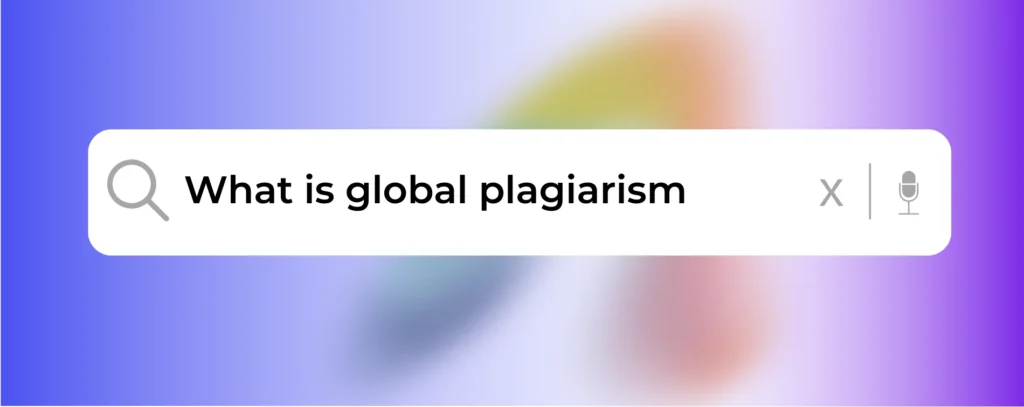
Global plagiarism is a serious form of academic dishonesty, because, well, it implies copying the whole work and just passing it off as if you wrote it. Not only do students not learn anything this way, but they also violate copyright rules. This type of plagiarism can manifest in various forms, including copying and pasting content from multiple sources or paying someone else to write a paper on one’s behalf.
Unlike other types of plagiarism, which may involve using parts of a text or paraphrasing without proper citation (with students still writing some things themselves), global plagiarism’s main characteristic is that it is a wholesale theft of intellectual property. It undermines the integrity of research and can have severe consequences, which we will also discuss further down in our article.
Global plagiarism is also almost the only type of copied content that can be noticed right away. Most of the time, professors know well enough what their students’ writings look like. So, if they simply copy somebody else’s text without altering it in any way, it will most likely stand out from their other works done on the same subject. This type of plagiarism is the most likely to be caught by the plagiarism detectors as well. It will just give out 100% results and the link to the original piece of the article (in case it was copied from an online source).
Example of Global Plagiarism
Consider a student writing a research paper on the impact of music on mental health. Instead of conducting their own research and analysis, the student finds an article by a respected researcher, covering the topic with all the data and analysis. The student then copies and pastes the entire article into their paper, submitting it as their own work. This act of global plagiarism violates academic honesty and disrespects the original author’s effort and intellectual property.
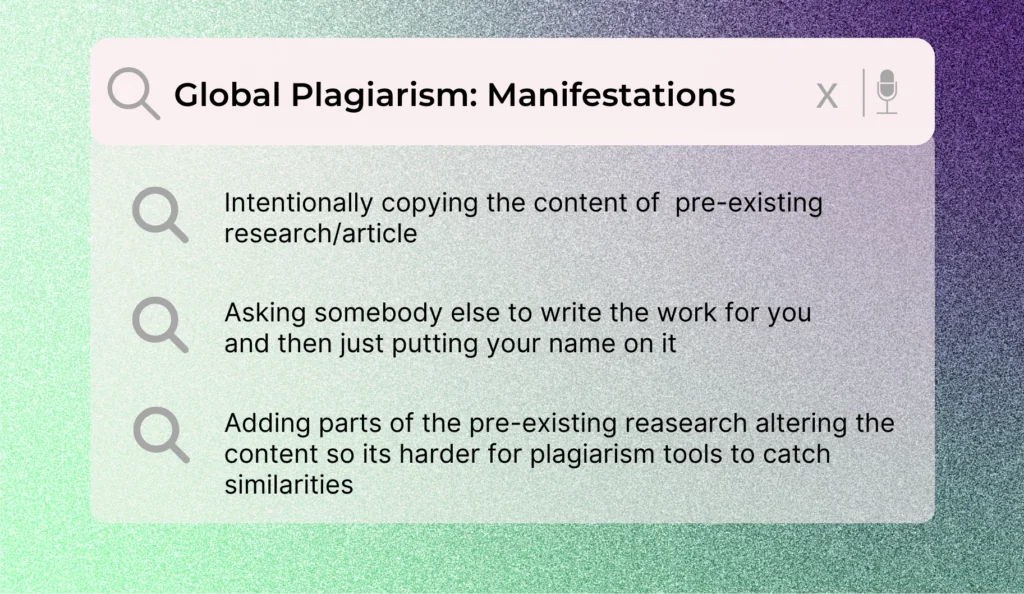
Consequences Of Global Plagiarism
As with any type of plagiarism, the global one also leads to far-reaching consequences. They can influence your personal, academic, as well as professional life. Let’s remind ourselves what students, caught engaging in global plagiarism, may face as a result of their actions:
- suspension, expulsion, or a permanent mark on their academic record,
- and fewer opportunities to get future educational and career prospects.
- in the professional career: losing their jobs, facing legal action, and damaging their professional reputation
Moreover, the impact of global plagiarism can also influence the reputation of an institution or organization associated with the plagiarist. Suppose a researcher or a company is found to have plagiarized. In that case, it can lead to a loss of trust among peers, clients, and the public, affecting the institution’s reputation and financial stability. Digitalization of our day-to-day interaction has worsened our chances of hiding that kind of action. At the same, it made it easier to plagiarize content in the first place. So, there are two sides to one coin: thanks to digital tools, it is now easier to detect plagiarised materials but also more damaging to the plagiarist’s online and real-life image.
Avoiding Global Plagiarism: How To
Avoiding global plagiarism is as easy as it gets: just DON’T copy the whole text from others and paste it into your work. And please, don’t submit the work you found online as your own. It won’t end up with anything good for you. As to more elaborate recommendations consider doing at least some of the things we mention below.
Do Regular Plagiarism Checks
Yes, when you write your research paper, literature review, or any type of work that requires accumulation of knowledge from other sources, check it for plagiarism on your own. First of all, this will help you make sure that you won’t face any problems or unnecessary accusations when submitting your work. Secondly, as most of the tools highlight specific places where the content seems to be plagiarised, you will be able to identify places where to add citations or that need to be more thoroughly rephrased.
Try our Free Plagchecker & See How it Works
Note any Quotes or Citations You Add
While writing your paper, you will switch back and forth between numerous sources. Thus, if you decide to take any ideas, it’s better to mark somewhere separately where these ideas were taken from and whether it’s a direct quote or interpretation in your own words. If you are working in Google Docs, you can select the needed sentences and leave relevant comments with the source and all the needed specifications.
Use Proper In-Text Citations and Bibliography References
This leads us to the next recommendation – proper citing. If you take our advice and take those notes regarding the materials you use, then adding in-text citations as well as references will be just a piece of cake. All you will have to do is just properly format the. mentioned source and that’s all. You can check out a citation generator to make the referencing and bibliography creation much quicker and easier.
Paraphrase the Content You Want to Include
Our last tip is to try to put the materials you want to use into your own words. There’s nothing wrong with adding direct quotes (as long as you cite them properly afterward), but it’s always a good idea to show your full understanding of the topic through paraphrasing. There are a lot of tools that you can turn to (one of them you can find directly on our website). Still, before turning to AI for help, try to rewrite the content yourself. Who knows, maybe you will find rephrasing to be your new superpower.
Preventive Measures to Minimize Global Plagiarism Cases
The change starts with you, it is true. So the more of us turn our heads away from plagiarism the more impact it will make globally. This change will be so much more powerful though, if we take a multifaceted approach to the minimization and prevention of future plagiarism cases.
Firstly, educational institutions should prioritize teaching the principles of academic integrity and the proper techniques for citation and referencing from an early stage. Workshops and seminars can be conducted to reinforce the importance of originality and the consequences of plagiarism. And, of course, the shift from the importance of grades to the importance of gained skills and knowledge is also a necessary step toward a plagiarism-free education environment.
Using plagiarism detection software in the submission process is still needed as well, but it should be complemented with manual checks by educators to make sure the software’s findings are accurate and to detect any sophisticated attempts at beating this technology. Encourage students to submit drafts at various stages of their work. This will help you, as educators, track the development of their ideas and writing, making it easier to spot any inconsistencies or sudden changes in tone and style.
Moreover, providing access to resources such as citation guides, writing centers, and tutoring services can empower students to produce original work and seek help when needed. Teachers should facilitate collaboration and discussion among students to foster a sense of accountability and reduce the temptation to plagiarize. With the necessary tools, support, and guidelines, both professors and learners can lower the amount of plagiarism cases.
FAQ
Follow us on Reddit for more insights and updates.


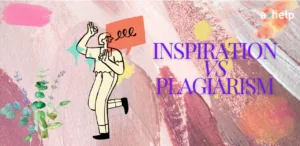
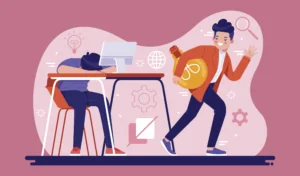
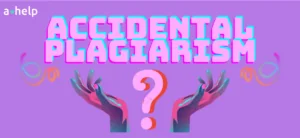
Comments (0)
Welcome to A*Help comments!
We’re all about debate and discussion at A*Help.
We value the diverse opinions of users, so you may find points of view that you don’t agree with. And that’s cool. However, there are certain things we’re not OK with: attempts to manipulate our data in any way, for example, or the posting of discriminative, offensive, hateful, or disparaging material.